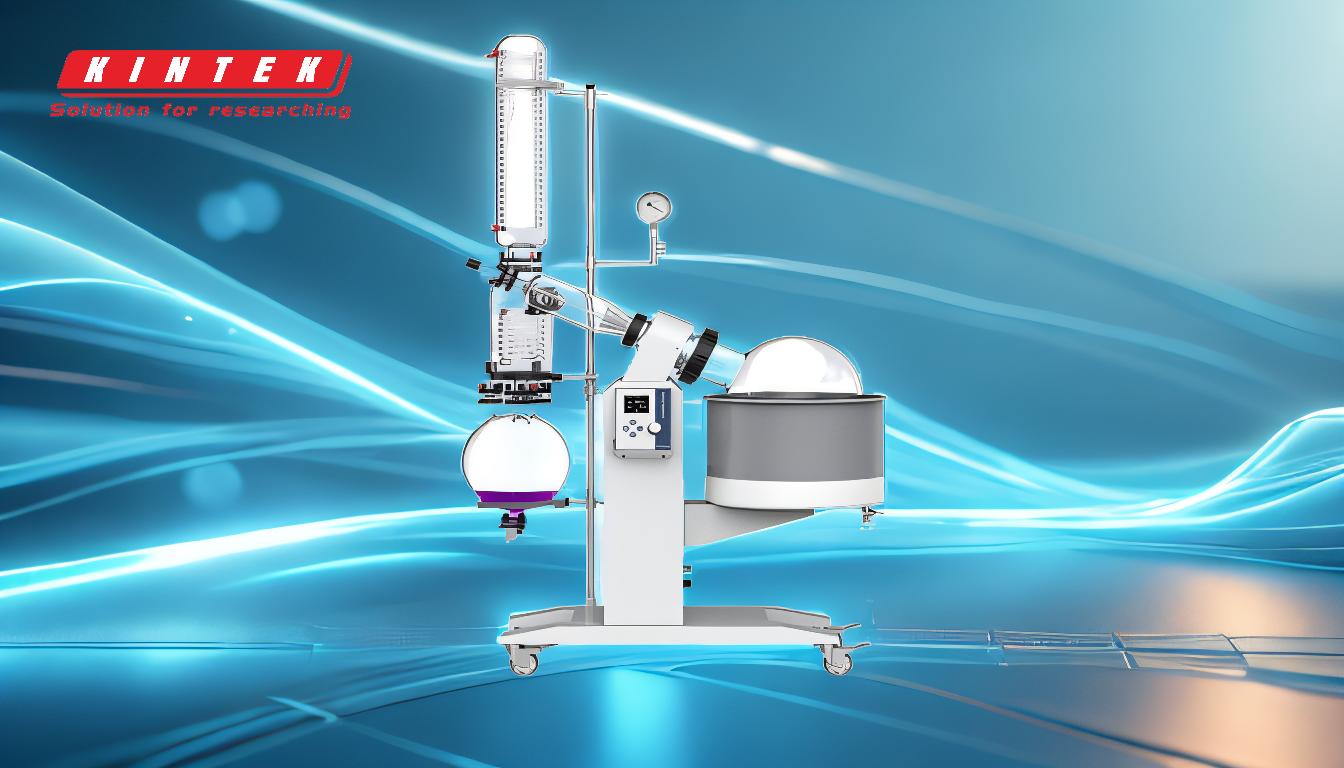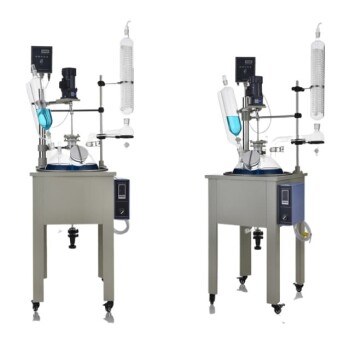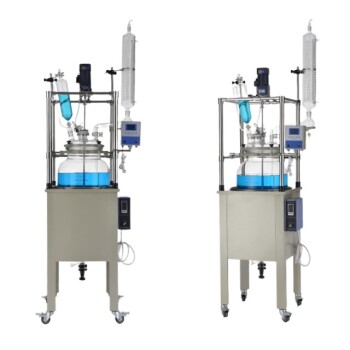A rotary evaporator is a versatile and essential piece of equipment in microbiology laboratories, primarily used for processes involving evaporation, concentration, purification, and separation of compounds. Its applications in microbiology include the extraction and purification of biological samples, solvent recovery, and preparation of samples for further analysis. The device is particularly useful for handling heat-sensitive materials, such as microbial cultures, plant extracts, and essential oils, ensuring minimal degradation of sensitive compounds. By operating under reduced pressure, rotary evaporators enable efficient solvent removal at lower temperatures, making them indispensable in microbiological research, pharmaceutical development, and biotechnology.
Key Points Explained:

-
Concentration of Samples:
- Rotary evaporators are widely used to concentrate samples by removing solvents or unwanted substances. This is particularly important in microbiology for preparing samples for analysis, such as microbial cultures or biological extracts.
- The process involves gently heating the sample while rotating it under reduced pressure, which allows for the efficient evaporation of solvents without damaging heat-sensitive compounds.
-
Solvent Recovery and Recycling:
- In microbiology laboratories, solvents are often used in extraction and purification processes. Rotary evaporators enable the recovery of these solvents, reducing waste and costs.
- The ability to recycle solvents is especially beneficial in large-scale microbial research or industrial applications where solvent use is extensive.
-
Purification of Biological Samples:
- Rotary evaporators are used to purify biological samples, such as plant extracts, essential oils, and microbial metabolites. This is achieved by separating the desired compounds from solvents or impurities.
- The process is crucial for obtaining high-purity samples for further analysis or use in microbiological experiments.
-
Extraction of Essential Oils and Natural Products:
- Microbiology laboratories often work with natural products, such as essential oils and plant extracts. Rotary evaporators are used to extract and concentrate these compounds efficiently.
- The gentle evaporation process ensures that heat-sensitive compounds, such as terpenes and flavonoids, are preserved.
-
Preparation of Samples for Analysis:
- Rotary evaporators are used to prepare samples for various analytical techniques, such as chromatography or spectroscopy. This involves removing solvents or concentrating samples to achieve the required purity and concentration.
- In microbiology, this is particularly important for drug development, chemical analysis, and quality control of biological products.
-
Handling Heat-Sensitive Materials:
- Many biological compounds are sensitive to high temperatures. Rotary evaporators operate under reduced pressure, allowing solvents to evaporate at lower temperatures, thus preserving the integrity of heat-sensitive materials.
- This feature is critical in microbiology for working with enzymes, proteins, and other labile compounds.
-
Distillation of Complex Mixtures:
- Rotary evaporators are used for the distillation of complex mixtures, such as microbial fermentation broths or plant extracts. This process separates components based on their boiling points.
- In microbiology, this is useful for isolating specific compounds, such as antibiotics or bioactive molecules, from complex biological matrices.
-
Crystallization of Compounds:
- Rotary evaporators are employed in the crystallization of compounds, which is a key step in purifying and isolating solid products from solutions.
- In microbiology, this is important for obtaining pure crystals of compounds like antibiotics or other bioactive molecules for further study.
-
Molecular Cooking and Heat-Sensitive Procedures:
- Rotary evaporators are used in molecular cooking and other heat-sensitive procedures in microbiology laboratories. This includes the preparation of specialized media or the extraction of delicate compounds.
- The precise control of temperature and pressure makes rotary evaporators ideal for these applications.
-
Applications in Pharmaceutical and Biotechnological Research:
- Rotary evaporators play a significant role in pharmaceutical and biotechnological research, particularly in the development of drugs and biologics. They are used for solvent removal, concentration, and purification of active pharmaceutical ingredients (APIs) and other compounds.
- In microbiology, this is essential for producing high-quality samples for research and development.
-
Separation of Solvents from Organic, Inorganic, and Polymeric Materials:
- Rotary evaporators are used to separate solvents from a wide range of materials, including organic compounds, inorganic salts, and polymers. This is particularly useful in microbiology for isolating specific compounds from complex mixtures.
- The process is efficient when the desired compound has a lower boiling point than the solvent and does not form an azeotrope with it.
-
Use in Reflux Process Reactions:
- Rotary evaporators are employed in reflux process reactions, where they help maintain a constant temperature and pressure, ensuring efficient reaction conditions.
- In microbiology, this is useful for synthesizing or modifying compounds under controlled conditions.
In summary, rotary evaporators are indispensable tools in microbiology laboratories, offering a wide range of applications from sample preparation and purification to solvent recovery and heat-sensitive procedures. Their ability to operate under reduced pressure and at controlled temperatures makes them ideal for handling delicate biological materials, ensuring the integrity and purity of samples for further analysis and research.
Summary Table:
| Application | Key Benefit |
|---|---|
| Concentration of Samples | Efficient removal of solvents without damaging heat-sensitive compounds. |
| Solvent Recovery and Recycling | Reduces waste and costs by recovering solvents. |
| Purification of Biological Samples | Separates desired compounds from impurities for high-purity samples. |
| Extraction of Essential Oils | Preserves heat-sensitive compounds like terpenes and flavonoids. |
| Preparation of Samples for Analysis | Ensures samples meet required purity and concentration for analytical techniques. |
| Handling Heat-Sensitive Materials | Operates at lower temperatures to preserve delicate biological compounds. |
| Distillation of Complex Mixtures | Isolates specific compounds like antibiotics from complex biological matrices. |
| Crystallization of Compounds | Purifies and isolates solid products like antibiotics for further study. |
| Molecular Cooking | Prepares specialized media and extracts delicate compounds under controlled conditions. |
| Pharmaceutical Research | Essential for solvent removal, concentration, and purification of APIs. |
| Separation of Solvents | Efficiently isolates compounds from organic, inorganic, and polymeric materials. |
| Reflux Process Reactions | Maintains constant temperature and pressure for efficient synthesis. |
Enhance your microbiology lab's efficiency with a rotary evaporator—contact our experts today to learn more!












